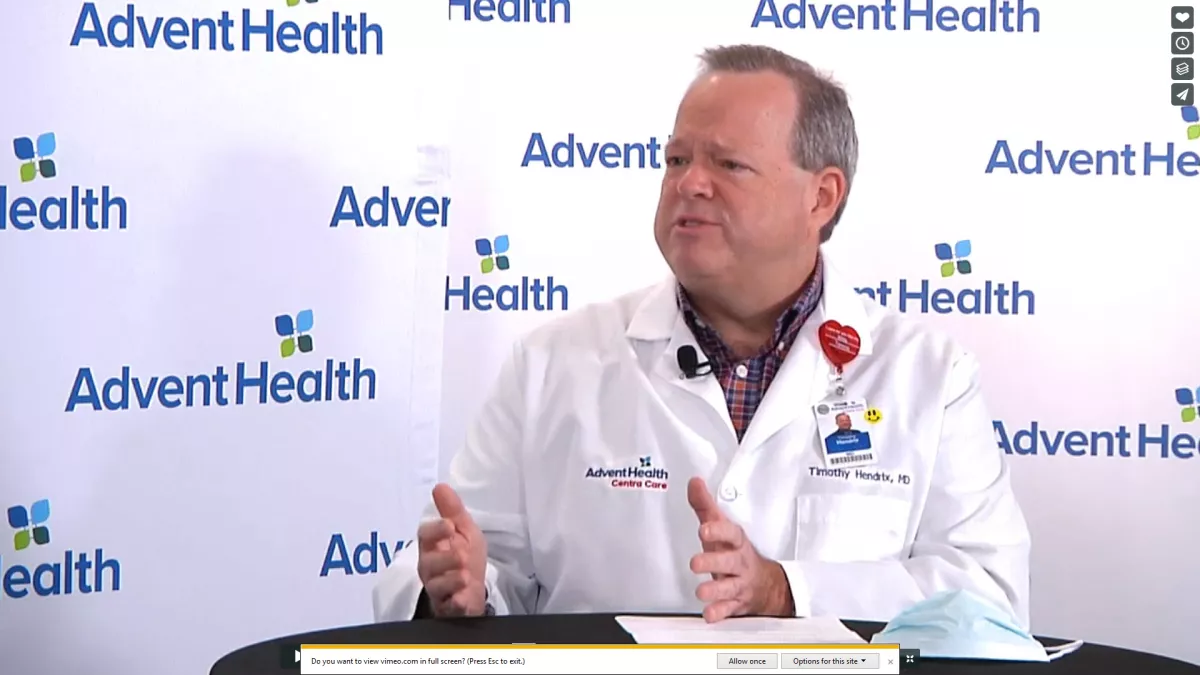- Beth Kassab
Choose the health content that’s right for you, and get it delivered right in your inbox.
More people are seeking treatment at AdventHealth Centra Care for heat-related illness as July brought historic scorching temperatures in Central Florida, following a record-setting June.
On average, Centra Care saw 11 patients a week in July with symptoms of heat exposure or heat exhaustion compared to no more than two patients a week in the same month last year. And June, which sent the mercury to record average daily highs, sent more than twice as many cases for treatment than last year.
“This looks more severe than previous years,” said Dr. Tim Hendrix, AdventHealth Centra Care’s senior medical director. “We have more children and adults presenting with nausea and vomiting. More lethargy. Its important people recognize the symptoms before they get to that point.”
Consequences from hotter temperatures are echoed in a new AdventHealth survey, which found that more than 30% of respondents said they or someone they care for has experienced a heat-related health emergency. And a wide majority of people surveyed – 77% -- said they think climate change poses health risks.
While older adults are often considered most vulnerable to prolonged heat exposure, about a third of the patients coming in to Centra Care are kids under the age of 16. Those patients are often visitors from out of state who are not acclimated to Florida and spending long days at the attractions.
About another third are local workers whose jobs require many hours outdoors facing hotter than usual conditions.
The average high temperature in Orlando for July was 94.5 degrees, 2.5 degrees higher than the mean high temperature during the same month during the nearly 30-year period between 1991 and 2020, according to the National Weather Service. During June, the average maximum temperature was 93.3 degrees, also higher than the mean of 90.8 degrees over the past 30 years.
Most of the cases coming in to Centra Care are mild and treated by cooling the patient’s core body temperature with ice packs on the back of the neck or under the arms and by drinking chilled fluids, Hendrix said.

Often, he said, getting out of the sun and into the air-conditioning can alleviate symptoms quickly.
If left untreated, heat exhaustion can progress to heat stroke, which can lead to brain damage and death.
Neurological symptoms such as confusion or stumbling while trying to walk require emergency treatment, Hendrix said.
As places across the U.S. and Europe logged record-setting heat waves this summer, people are taking precautions to keep themselves healthy. While 31% of people surveyed said they experienced heat-related illness at some point in their lifetimes, a far larger group of more than three quarters of respondents said they were confident or somewhat confident that they could identify when someone needs care for heat illness.
Drinking more water was the No. 1 way people reported they take precautions during hotter months (87%) with taking breaks from the heat (68%) and avoiding being outside (67%) the other top ways people change their behavior to stay cool.
Just 31% said they wear hats or long sleeves to shield themselves from the sun, though 58% reported wearing sunscreen. Forty-two percent said they avoid exercising outdoors in favor of indoor workouts.
Among the 77% of people who said climate changes poses health risks, pollution, rising oceans, threatening weather patterns and disruptions to food and water supplies were noted as dangers along with more heat exposure.
A 2021 report from National Oceanic and Atmospheric Administration said extremely hot days have become more intense and more frequent across most parts of the globe since the 1950s. The report noted “this trend is expected to continue with climate change driving more hot days.”
“We are seeing the effects of climate change on our daily lives and our health,” Hendrix said. “Moving forward we’re going to have to understand how to stay cool and recognize the symptoms of heat exhaustion.”
The survey included 525 adults across AdventHealth markets in nine states.
Recent News
AdventHealth Corporate Care Tampa will serve the unique medical needs of first responders and corporate clients throughout the West Florida region.
June is Men’s Health Month, a time to shine a spotlight on the unique health challenges men face and the importance of proactive care. Among these challenges, low testosterone levels stand out as a...
AdventHealth is excited to welcome Andrew Prizigley, PA-C, to our team at AdventHealth | Southeastern Orthopedics and Spine at Turtle Creek*. Prizigley is a board-certified physician assistant and...
Bob Smith, 86, stays strong and committed to his health thanks to 18 years with AdventHealth Shawnee Mission’s Move 4 Life Program.
AdventHealth Centra Care’s Dr. Tim Hendrix shares essential summer safety tips for wherever your plans may take you.
AdventHealth Centra Care’s Dr. Tim Hendrix shares essential summer safety tips for wherever your plans may take you.
AdventHealth Aurora Highlands will be served by geothermal energy, helping reduce carbon emissions and energy consumption.
For Dr. Matthew Wideroff, planting roots in Palm Coast felt like the right next step in both his career and family life. After years of surgical training and early practice outside the state, the Boca...
AdventHealth is the latest hospital to join the KCH Affiliate Network, a growing initiative designed to enhance pediatric care across Kentucky.
AdventHealth is expanding once again in Polk County with the opening of a new heart care office in Lake Wales. The space will allow Dr. Saiyed Mohib, the first cardiologist at AdventHealth Lake Wales...
AdventHealth Avista has once again been honored with the prestigious designation of Orthopedic and Spine Center of Excellence by DNV Healthcare.
In 2018, a transplant team at AdventHealth Transplant Institute gave Karen Black a new heart.












